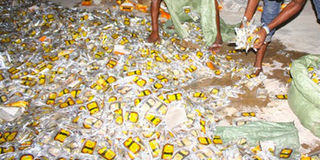‘Viroba’ production and drinking ban apt move

The government has declared that come March 1, packaging of spirits in sachets, commonly known as viroba, will illegal
What you need to know:
- The sachets have made alcohol most affordable, which in itself, is factor that has made it possible for people of all ages and economic status to access easily.
- Young Tanzanians, including schooling-going youth, indulge in drinking spirits in sachets which are sold side by side with biscuits, pens, fruits and all manner of merchandise on roadsides.
The government has declared that come March 1, packaging of spirits in sachets, commonly known as viroba, will illegal. We consider the decision most appropriate and hope it shall be implemented.
The sachets have made alcohol most affordable, which in itself, is factor that has made it possible for people of all ages and economic status to access easily.
Young Tanzanians, including schooling-going youth, indulge in drinking spirits in sachets which are sold side by side with biscuits, pens, fruits and all manner of merchandise on roadsides.
Tanzanian laws forbid drinking or venturing into premises where alcohol is dispensed by anyone under 18, yet our young can get alcohol as they buy sweets or biscuits at the vendor’s. All this is thanks to viroba that are sold at any place, anytime of the day.
As the Minister of State in the Vice President’s Office (Union and Environment), Mr January Makamba, sachets of liquor that are of dubitable quality have penetrated the viroba market.
Makers of such illicit alcohol undertake their production in backyards and generally, they have no idea what quality, hygiene and standards are all about. This, of course, endangers the lives of consumers.
It means, the abolishment of viroba isn’t just about protecting the environment, it is also about protecting the lives of Tanzanians who would unwittingly buy the sachet.
The viroba which are manufactured in backyards provide supplies for a parallel market which satisfy a sizeable population of consumers, who would then see no need to buy from the mainstream market. According to Mr Makamba, this situation causes the government a loss of at least Sh600 million in unpaid taxes.
It means, by allowing the sale of viroba, it is not only the lives of our people which are jeopardised; the economy is endangered too. That is why it makes a lot of sense to ban the production and consumption of viroba.
PROTECT THE ECO-SYSTEM
Human settlement planning is there to ensure cities, towns and villages are properly arranged to facilitate smooth development. This matter is guided by the 2004 Land Act and as was amended.
One of the key aspects of the law is the prohibition for people to put up structures within 60 metres of features such as rivers, lakes and the sea.
Human activities are, therefore, generally restricted within that area. The restriction serves to protect such features and safeguard the environment.
Violating the law, therefore, leads to degradation of the environment in and around the features, exposing human beings and nature to hazards like floods.
A brief survey in various parts of the country will reveal that often, people breach the environmental law. This happens in the full sight of law enforcing organs. The question is: why would someone start putting up a structure close to a river, and the authorities take no action?
Partly, the answer is that someone must be sleeping on their job. Therefore, sensitisation must be continuous. Street and village leaders must be empowered to handle such matters so that decisions are made without delay.
It is important to continue putting in check human activities in order to protect the country’s eco-systems.




